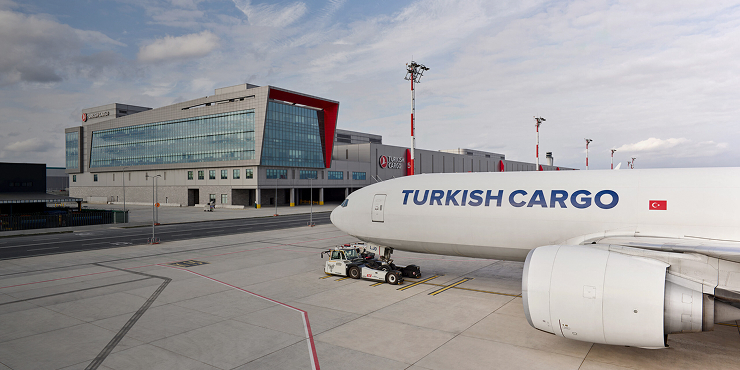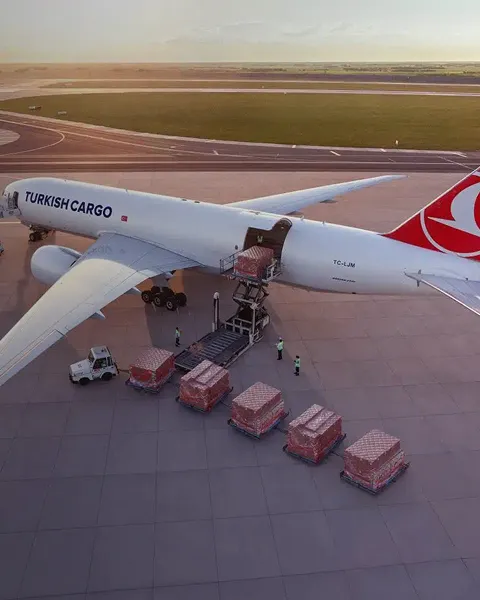Customer Story

Turkish Cargo partnered with ICRON easie to implement an Air Cargo Revenue Management (ACRM) to maximize capacity utilization and efficiency. They experienced a 2% increase in revenue within six months since the ACRM was implemented. The easie ACRM has also received international acclaim for its exceptional coverage and robust performance.
Turkish Cargo caters to 340 destinations worldwide and is acclaimed as the fastest-growing cargo airline in the world. In the coming years, Turkish Cargo aims to double its carried tonnage and expand its cargo storage capacity to 4.5 million tons. As the business grows in network and tonnage, scaling up its revenue management systems is critical. Turkish Cargo partnered with ICRON to adopt an Air Cargo Revenue Management System (ACRM) that enables them to leverage AI-powered SaaS-based planning solutions from easie – ICRON’s decision intelligence hub for aviation. The new ACRM will play a significant role in Turkish Cargo’s journey towards sustainable growth, higher operational capabilities, and state-of-the-art infrastructure.
As the aviation industry molds itself to the new post-pandemic business environment, Turkish Cargo defined the following goals for this project:
Optimal use of cargo space and reducing inefficiency in capacity utilization.
Improving booking and allotment systems to avoid revenue spoilage. Shifting the focus from space-filling to revenue contributions and margins.
Redefining the booking policies and strategy. Making decisions based on accurate data – to reduce unused capacity without customer dissatisfaction
Determine data-driven strategies that enable quick and effective decision-making that aligns operations with business goals.
Improve end-to-end visibility to make informed decisions on capacity, revenue, contribution, and cost.
Leverage AI-powered forecasting techniques to enhance the efficiency of real-time capacity changes after every booking.

The worldwide air cargo market is valued at over $150 billion. However, numerous operations in this domain have yet to be automated or digitalized. Besides the challenges of offline operations and lack of transparency, Turkish Cargo saw the potential to increase efficiency and sustainability in their business. They were looking for the right technological solutions for the following industry challenges:
The air cargo industry holds several layers of stakeholders in its supply chain. Shippers, carriers, freight forwarders, and ground handlers are a few of them. To add to the complexity, some stakeholders rely on outdated IT infrastructure and manual systems for data sharing and processing. It makes the entire system non-transparent, leading to fragmented communications, limited tracking capabilities, and lost opportunities.
Demand volatility has always been an intrinsic challenge in the aviation industry. For air cargo, capacity uncertainty and demand volatility hinder accurate forecasting and planning for capacity utilization. Capacity changes due to the route, aircraft type, passenger/load variance, and other factors make it difficult for Turkish Cargo to maximize capacity utilization.
Various cargo carriers use overbooking to maximize revenue by compensating for no-shows and booking cancellations. Devising an efficient process that intelligently uses overbooking to optimize capacity utilization is easier said than done. Considering the multi-dimensional capacity constraints, uncertain show-up rates, offloading costs, and non-standard cancellation terms and penalties add complexity to the process.
A shipment’s pricing is influenced by several factors, including chargeable weight, cargo volume, flight chosen, block hour, and product type. Shipments involving cargo from the pharmaceutical industry, live animals, or uniquely shaped items may need more capacity than others. All these factors must be considered and evaluated to dynamically price cargo capacity before a price is committed.
A revenue management system based on offline data sources and electronic data interchange cannot forecast the belly capacity of a passenger aircraft in real-time. This inhibits cargo airlines from maximizing their capacity utilization in this domain.

Turkish Cargo required an Air Cargo Revenue Management system that offered advanced forecasting capabilities while improving end-to-end visibility in their airline ecosystem. ICRON easie helped the airline develop a scalable and reliable ACRM solution that addressed their challenges and empowered the Turkish Cargo business for the long run. Here is a look at the solutions:
Integrating and synthesizing the fragmented data from numerous stakeholders to promote better visibility and decision-making across all business operations. The easie ACRM was equipped with advanced AI-driven tools that helped streamline real-time decision-making by offering valuable pricing and capacity insights.
Facilitating optimized pricing decisions via APIs to foster agile and competitive pricing strategies for every reservation request. Synergizing demand, capacity, and market data to accurately forecast variables and validate real-time occurrences.
Leverages advanced algorithms to predict demand and align with available capacity to capitalize on market opportunities. It helps ensure precision in capacity management and network-wide optimization for Turkish Cargo.
Building an efficient sales process that enhances customer satisfaction with optimized decisions, real-time insights, and rapid responses to changing market dynamics. The easie ACRM seamlessly integrates with global digital sales channels, ensuring efficient sales operations and expanded market reach.
Adjusting the price dynamically based on demand fluctuations, spot allotments, and contract processes to maximize revenue and capacity utilization. Utilizing decision intelligence to create an efficient overbooking system that minimizes spill and spoilage of capacity and revenue.
Comprehensive AI-powered planning solution that supports strategic, tactical, and operational planning needs. The easie ACRM enables optimal decisions to address demand, capacity, and market data forecasting challenges. It helps simplify the process of predicting belly capacity with intelligent analytics amidst rapidly changing market conditions
Your form has been received. We'll be in contact with your shortly!